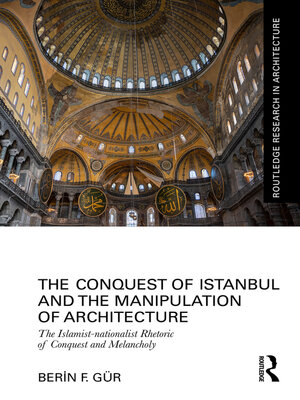The Conquest of Istanbul and the Manipulation of Architecture
ebook ∣ The Islamist-nationalist Rhetoric of Conquest and Melancholy · Routledge Research in Architecture
By Berin F. Gür

Sign up to save your library
With an OverDrive account, you can save your favorite libraries for at-a-glance information about availability. Find out more about OverDrive accounts.
Find this title in Libby, the library reading app by OverDrive.



Search for a digital library with this title
Title found at these libraries:
| Library Name | Distance |
|---|---|
| Loading... |
This book explores the contemporary memory of the Ottoman conquest of Constantinople (now Istanbul) in 1453. It focuses on how the conquest is remembered by Islamist-nationalist imagination in Turkey today and how architecture plays a role in shaping this memory, underscoring its susceptibility to political manipulation.
Discussing Islamist-nationalist rhetoric of Istanbul's conquest through the conceptual framework of melancholy—a significant theme in the history of ideas—the argument posits that this narrative is a politically driven endeavor fueled by paranoia, producing melancholy over the conquest of Istanbul. This book redefines melancholy as 'a politically manipulated project', which anchors the imagery of conquest to spatial and architectural symbols of mourning while creating imaginary lost objects. Architecture becomes the book's subject as the bearer of clues to searching for lost objects and as a spatial-political tool of conquest rhetoric, such as the Hagia Sophia in Istanbul and the Panorama 1453 History Museum. As various groups with differing ideologies and identities continue to feel the impact of the conquest, this book also examines the 'other' side of the event—specifically, how the Greeks commemorate the fall of Constantinople, recognizing it as a dark memory from their perspective.
This book targets diverse audiences in cultural studies, social sciences, arts, and humanities—including architecture, history, anthropology, and political studies—interested in Southeast Europe and Islamic societies.







